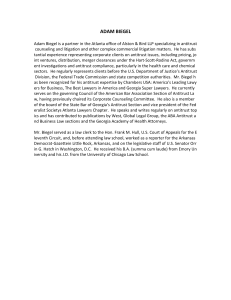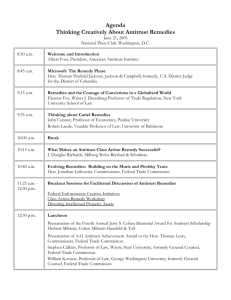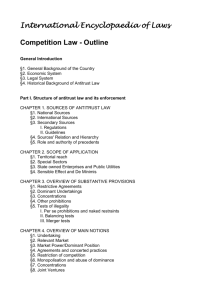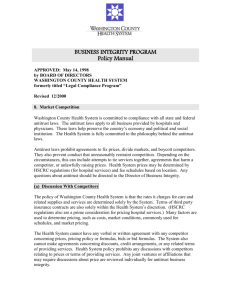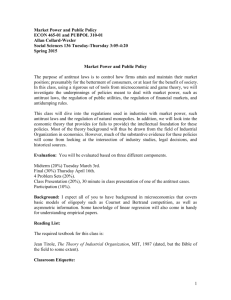EXPLANATION
advertisement
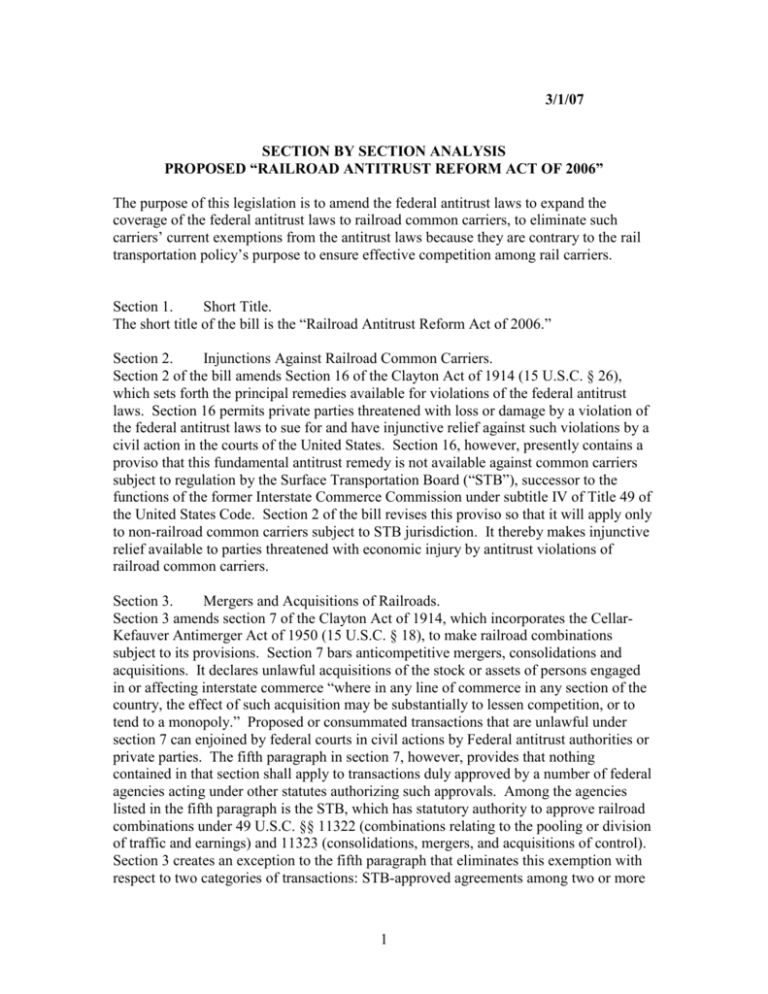
3/1/07 SECTION BY SECTION ANALYSIS PROPOSED “RAILROAD ANTITRUST REFORM ACT OF 2006” The purpose of this legislation is to amend the federal antitrust laws to expand the coverage of the federal antitrust laws to railroad common carriers, to eliminate such carriers’ current exemptions from the antitrust laws because they are contrary to the rail transportation policy’s purpose to ensure effective competition among rail carriers. Section 1. Short Title. The short title of the bill is the “Railroad Antitrust Reform Act of 2006.” Section 2. Injunctions Against Railroad Common Carriers. Section 2 of the bill amends Section 16 of the Clayton Act of 1914 (15 U.S.C. § 26), which sets forth the principal remedies available for violations of the federal antitrust laws. Section 16 permits private parties threatened with loss or damage by a violation of the federal antitrust laws to sue for and have injunctive relief against such violations by a civil action in the courts of the United States. Section 16, however, presently contains a proviso that this fundamental antitrust remedy is not available against common carriers subject to regulation by the Surface Transportation Board (“STB”), successor to the functions of the former Interstate Commerce Commission under subtitle IV of Title 49 of the United States Code. Section 2 of the bill revises this proviso so that it will apply only to non-railroad common carriers subject to STB jurisdiction. It thereby makes injunctive relief available to parties threatened with economic injury by antitrust violations of railroad common carriers. Section 3. Mergers and Acquisitions of Railroads. Section 3 amends section 7 of the Clayton Act of 1914, which incorporates the CellarKefauver Antimerger Act of 1950 (15 U.S.C. § 18), to make railroad combinations subject to its provisions. Section 7 bars anticompetitive mergers, consolidations and acquisitions. It declares unlawful acquisitions of the stock or assets of persons engaged in or affecting interstate commerce “where in any line of commerce in any section of the country, the effect of such acquisition may be substantially to lessen competition, or to tend to a monopoly.” Proposed or consummated transactions that are unlawful under section 7 can enjoined by federal courts in civil actions by Federal antitrust authorities or private parties. The fifth paragraph in section 7, however, provides that nothing contained in that section shall apply to transactions duly approved by a number of federal agencies acting under other statutes authorizing such approvals. Among the agencies listed in the fifth paragraph is the STB, which has statutory authority to approve railroad combinations under 49 U.S.C. §§ 11322 (combinations relating to the pooling or division of traffic and earnings) and 11323 (consolidations, mergers, and acquisitions of control). Section 3 creates an exception to the fifth paragraph that eliminates this exemption with respect to two categories of transactions: STB-approved agreements among two or more 1 rail carriers relating to rates subject to 49 U.S.C. § 10706; and transactions described in 49 U.S.C. § 11321, i.e. STB-approved rate agreements or combinations subject to §§11322 and 11323. Section 4. Limitation of Primary Jurisdiction. Section 4 removes any requirement that a federal district court defer to the primary jurisdiction of the STB in any civil antitrust action against a common carrier railroad (1) by a private party seeking treble damages (15 U.S.C. § 15); (2) by the United States seeking an injunction (15 U.S.C. § 25); or (3) by a private party seeking an injunction (15 U.S.C. § 26). Section 5. Federal Trade Commission Enforcement. Section 5 changes existing law so that the Federal Trade Commission (“FTC”) may enforce the antimerger and other provisions of the Clayton Act against railroad common carriers. Section 11(a) of the Clayton Act, 15 U.S.C. § 21(a), presently vests such authority in the STB. Section 5 of the bill amends this provision to create an exception to the STB’s enforcement jurisdiction under the Clayton Act with respect to two categories of transactions: STB-approved agreements among two or more rail carriers relating to rates subject to 49 U.S.C. § 10706; and transactions described in 49 U.S.C. § 11321, i.e. STB-approved agreements or combinations subject to §§ 11322 and 11323. Since Section 11(a) of the Clayton Act vests in the FTC authority to enforce its provisions where enforcement authority is not assigned to other agencies, the exceptions from the STB’s authority enacted by section 5 will fall within the jurisdiction of the FTC. Section 6. Expansion of Treble Damages to Rail Common Carriers. Section 6 eliminates the judicially-created barrier against recovery of private antitrust damages from railroad carriers presently required by the “Keogh Doctrine,” which holds that shippers injured by a railroad’s antitrust violations are limited to the railroad’s filed rate). Keogh v. Chicago & Northwestern Railway, 260 U.S. 152 (1922). Section 6 of the bill adds a new subsection to the treble damage provision in section 4 of the Clayton Act. It provides that treble damages shall be available in civil antitrust suits to parties injured by railroad antitrust violations without regard to whether such railroads have filed rates or whether a complaint challenging rates has been filed. Section 7. Termination of Antitrust Exemptions in Title 49. Section 7 eliminates certain exemptions from the antitrust laws presently enjoyed by railroad common carriers under subchapter IV of Title 49. First, 49 U.S.C. § 10706(a)(2)(A), (4) and (5) ) currently exempt from the antitrust laws ratemaking agreements among railroads that are approved by the STB. Section 7(a)(1) of the bill amends this provision by striking the exemption. Second, 49 U.S.C. § 10760(e) currently provides for a periodic report by the FTC and the Antitrust Division of the Department of Justice on possible anticompetitive features of railroad rate agreements approved by, or submitted to the STB. Section 7(a)(2) of the bill strikes this provision and substitutes a command that nothing in section 10706 exempts proposed agreements described in section 10706 from the antitrust laws, and a requirement that the STB and any other reviewing agency consider the impact of the proposed agreement on shippers and on 2 affected communities. Third, 49 U.S.C. § 11321 currently exempts from the antitrust laws transactions described therein, i.e. STB-approved railroad agreements or combinations subject to 49 U.S.C. §§ 11322 (combinations relating to the pooling or division of traffic and earnings), or to 49 U.S.C. § 11323 (consolidations, mergers, and acquisitions of control). Section 7(b) (1) strikes this exemption. Section 7(b)(2) and adds to 49 U.S.C. § 11321 a new subsection (c) commanding that nothing in section 10706 exempts proposed agreements described in section 10706 from the antitrust laws, and requiring that the STB and any other reviewing agency consider the impact of the proposed agreement on shippers and on affected communities. Section 8. Effective Date Section 8 provides that the effective date of this Act shall be the date of enactment with one exception. Actions that occurred prior to the enactment of the Act that were exempt from the antitrust laws pursuant to orders of the Interstate Commerce Commission or the Surface Transportation Board may not be the subject of a civil action or complaint under the antitrust laws. However, after a grace period of 180 days after the enactment of the Act, civil actions or complaints under the antitrust laws may be filed against such actions if they continue subsequent to the date of enactment of the Act. 3

